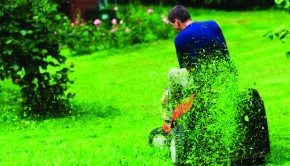Pet First-Aid Kits
All-Natural Home Health Care
“First-aid is the first thing you can do to help an injured animal if you are prepared,” says Dr. Jason Nicholas, owner of The Preventive Vet, in Portland, Oregon. Attention in cases of injury or sudden illness can help a dog or cat stay more comfortable, stop bleeding and provide temporary relief.
A pet first-aid kit can resemble a pantry more than a medicine cabinet. Natural components include:
Cool water. Purified water kept in a spray bottle can cool overheated pets. For the fastest results, spray near the pulse points, the “armpits” and where fur is the thinnest. Further, a vet will assess if clinical hydration is needed beyond the water bowl.
Saline solution. Versatile saline is available at the vet’s office or any pharmacy, and also easy and inexpensive to make at home. Use it to flush debris from eyes, clean wounds and promote healing from incisions. Two teaspoons of non-iodized salt in four cups of boiled water mimics body fluids. The Ohio State University Medical Center website provides a recipe for normal saline solution at Tinyurl.com/SalineRecipe.
Vinegar. It acts as a drying agent, especially for floppy-eared dogs taking a dip in a pool or natural waterway, which can leave the inner ear moist. “Don’t use vinegar if the skin is red or broken because it will be painful,” says Dr. Jules Benson, vice president of veterinary services at Petplan Pet Insurance, in Newtown Square, Pennsylvania. Never use it more than twice a week.
Honey. Apply this sweet unguent to gums to help counteract low blood sugar and shock, particularly when a diabetic pet’s insulin levels are off. Maple syrup is a good substitute.
Sugar. Although not recommended in a regular pet diet, sugar can be a topical antibacterial for the short term. Sugar draws water from the wound and dehydrates bacteria, supporting growth of new tissue.
Plain yogurt. Adding this healthy refrigerated topping to dry food will activate a sluggish appetite and supply needed cultures to help balance the digestive system.
Cornstarch. This non-toxic remedy helps stop minor bleeding from cuts, scrapes and pedicure accidents.
Calendula. Also known as pot marigold, calendula cream may be used as an anti-inflammatory. Bug bites, scrapes, sunburn and itching from allergies also benefit from its application.
Aloe. Easily grown in a garden or pot and available in gel form, aloe sooths burns, prevents blisters and speeds healing. It also serves as canine Chapstick. “Older dogs often have cracked skin on their noses,” notes Benson. “Aloe helps to heal the skin and keeps the dog comfortable.”
Rescue Remedy. Illness or injury brings stress, and one common solution is Rescue Remedy. To relieve fear or anxiety, rub it onto a paw, nose or ears or add the recommended number of drops to water, a treat or food. It helps dogs, cats, horses, birds, fish and even iguanas. Dosage relies on the extent of stress rather than weight or species.
Clean cloths. For bee stings or insect bites on the body, cool compresses can reduce swelling and itching. Wet a washcloth with cold water or for larger welts, wrap an ice pack in a towel and apply for a few minutes at a time. For stings on the face or mouth, it’s best to go to the vet’s office immediately, so that airways don’t swell up and hinder breathing.
Miscellaneous supplies. Keep on hand gauze, tape, small scissors, tweezers (for removing objects from the roof of the mouth or splinters), a small flashlight, clean socks to cover a bandage and disposable gloves to keep human germs out of open wounds. A dog in pain may bite without realizing it. Nicholas recommends a basket muzzle, so the dog can easily breathe and pant.
When a pet eats or drinks non-food items or foods they shouldn’t, such as chocolate, grapes or onions, head to the local vet. Veterinarian Jeff Levy, in New York City, who is also a certified veterinary acupuncturist, counsels, “Always keep contact information for your vet, an emergency hospital and animal poison control center handy.” Also, find out where emergency services are located when traveling.
Pets can go into shock just like humans. To prevent or reduce the impact, keep the animal warm and provide a deep massage of the ears, at the base, where ears meet the head. A couple of drops of lavender oil on a collar or bandana will help everyone relax. Do not put essential oils directly on the pet, especially cats, as it can be toxic.
Just like children, pets may have accidents or get sick after office hours. Stay calm, head for the natural pet pantry and then call the family’s holistic veterinarian.
<












